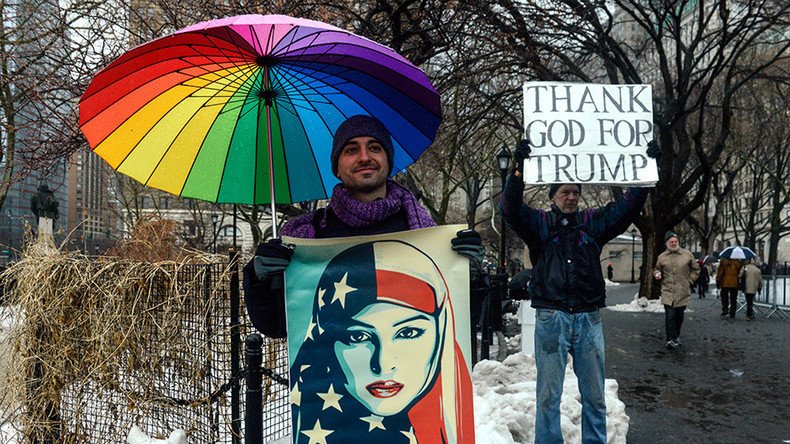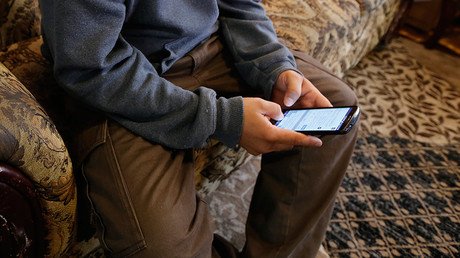Anti-Muslim groups skyrocketed as Trump 'electrified the radical right' - report

Radical right movements in the US were energized last year unlike any point since the 1960s and made 2016 a "banner year for hate," said the Southern Poverty Law Center, attributing the development to Donald Trump's political ascendancy.
While the overall number of documented hate groups in the US only rose slightly — from 892 in 2015 to 917 last year — Trump's incendiary campaign rhetoric on race, gender, religion, and immigration "electrified the radical right, which saw in him a champion of the idea that America is fundamentally a white man’s country," the SPLC said in its annual report, titled 'The Year in Hate and Extremism' and published Wednesday.
The 917 hate or extremist groups counted in 2016 by the SPLC falls short of a high of 1,018 in 2011, at the end of President Barack Obama's first term. However, "the numbers undoubtedly understate the real level of organized hatred in America" that received a boost in mainstream politics through Trump's rise to the White House, wrote SPLC senior fellow Mark Potok.
917 hate groups were operating in the US in 2016—just 100 shy of the most we’ve ever recorded since first tracking the radical right in 1990 pic.twitter.com/qYJGHNcJGy
— SPLC (@splcenter) February 15, 2017
"A surge in right-wing populism, stemming from the long-unfolding effects of globalization and the movements of capital and labor that it spawned, brought a man many considered to be a racist, misogynist and xenophobe into the most powerful political office in the world," Potok wrote.
In the month following Trump's election, the SPLC recorded 1,094 incidents of "bias-related harassment and intimidation" across the US. In more than a third of those incidents, assailants directly referenced Trump, his slogan "Make America Great Again," or his past remarks about women.
The most dramatic growth in the number of hate groups was the near-tripling of anti-Muslim hate groups: from 34 in 2015 to 101 last year pic.twitter.com/4NKwfbHW3h
— SPLC (@splcenter) February 15, 2017
Anti-Muslim hate groups nearly tripled in 2016, the SPLC found, from 34 in 2015 to 101 in 2016. Trump's campaign threats included a potential ban on Muslim immigration and a registry of all Muslims in the US. In October, authorities foiled a bombing plot in Kansas, in which three members of a "militia-like group called the Crusaders" planned to blow up an apartment complex that housed more than 100 Somali Muslim immigrants the day after the November 8 election.
Other extremist ideologies showed more modest gains or even decreases in number of groups across the US, thanks in part to Trump's endorsement of many of their beliefs on the biggest political stage in the country, Potok said.
"While the overall level of hate groups remained fairly steady, the period saw a noticeable drop in real-world extremist activities like rallies and violence," Potok wrote, adding that "there hardly seemed a reason to organize their own rallies when extremists could attend a Trump event filled with just as much anti-establishment vitriol as any extremist rally."
Ku Klux Klan groups fell off by 32 percent, from 190 in 2015 to 130 last year, SPLC said, while anti-government "Patriot" groups fell from 998 in 2015 to 623 last year.
But in contrast to the overall growth in hate groups, antigovernment groups saw a 38% decline, from 998 groups in 2015 to 623 last year pic.twitter.com/boInX7LpGQ
— SPLC (@splcenter) February 15, 2017
"Intensely focused on the federal government as its chief enemy, the Patriot movement swelled when the nation was led by a black man suspected of being a foreign-born Muslim and worse," Potok wrote. "But as 2016 progressed, Patriots increasingly grew hopeful that Trump would become the new face of the federal government."
Neo-Confederate groups rose from 35 to 43 last year, while neo-Nazi organizations decreased from 26 to 16 by the end of 2016, the SPLC said.
Historic highs in violence against trans people marked a reenergized anti-LGBT movement, the SPLC reported, which focused on so-called religious freedom legislation across the country aimed at allowing individuals to discriminate against gay, lesbian, bisexual and transgender people based on religious beliefs.
The overall number of groups likely understates the real level of organized hatred since growing numbers of extremists operate mainly online
— SPLC (@splcenter) February 15, 2017
The so-called alt-right movement also rose to to new heights in the US, thanks in part to Trump's campaign and his selection of former Breitbart News head Stephen Bannon as his chief strategic adviser. The Alt-Right is "essentially a rebranding of white nationalism meant to make it seem more acceptable in the political mainstream," Potok wrote.
Despite the unpredictability of where this rise of right-wing extremism in America will lead, Potok wrote that, "One thing seems certain. The radical right is feeling its oats today in a way that few Americans can remember."














